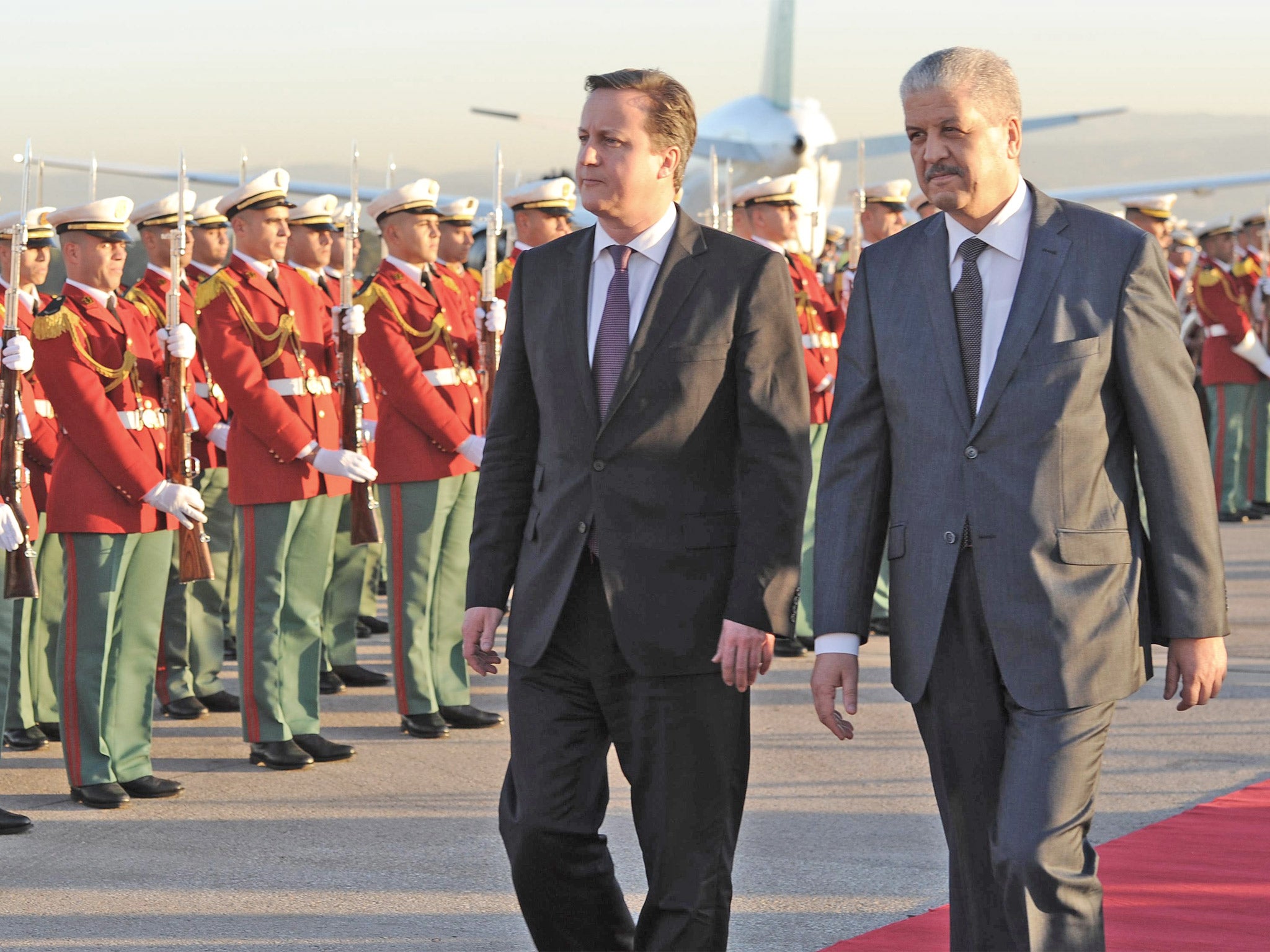Britain forges new Algeria alliance to fight terrorism
David Cameron to propose 'strengthened security partnership' as intelligence chiefs join him on historic visit

Your support helps us to tell the story
From reproductive rights to climate change to Big Tech, The Independent is on the ground when the story is developing. Whether it's investigating the financials of Elon Musk's pro-Trump PAC or producing our latest documentary, 'The A Word', which shines a light on the American women fighting for reproductive rights, we know how important it is to parse out the facts from the messaging.
At such a critical moment in US history, we need reporters on the ground. Your donation allows us to keep sending journalists to speak to both sides of the story.
The Independent is trusted by Americans across the entire political spectrum. And unlike many other quality news outlets, we choose not to lock Americans out of our reporting and analysis with paywalls. We believe quality journalism should be available to everyone, paid for by those who can afford it.
Your support makes all the difference.Britain will share intelligence from MI6 and GCHQ with the Algerian Government as part of a new joint security partnership in the wake of the In Amenas hostage crisis, David Cameron has said.
Arriving in Algiers as the first British Prime Minister to visit the country since independence, Mr Cameron said he would be announcing a "strengthened security partnership" between Britain and Algeria.
Talks on closer security co-operation will start in the spring with a progress report in the summer. The British side will be led by Sir Kim Darroch, the prime minister's national security adviser, who is with Mr Cameron on the trip, as is the head of MI6, Sir John Sawers.
British soldiers will also work with the Algerians on a limited number of operations. This could potentially include the training of Algerian special forces by British special forces, although this has not been confirmed by the Government.
Mr Cameron said his aim was to help the country "help itself" amid a growing threat from al-Qaida-linked terrorists in the region.
"I would stress the greatest threat of terrorism in this region is to the countries of this region," he said. "Of course there are potential threats to the UK, but the focus is very much on helping these countries to protect their security and protect British people in this region. It is very much about helping the region to help themselves."
The partnership is also designed to give British advice on how to tackle the cross-border jihadists operating both in Algeria and neighbouring Mali. But Mr Cameron stressed that the British response in Mali – and other countries affected by Islamic extremism – should be a combination of factors and not just a military one.
"We don't look at this region and think that the answer is purely a military one – it isn't.
"What is required in countries like Mali – just as countries like Somalia on the other side of Africa – is that combination of a tough approach on security, aid, politics, settling grievances and problems, an intelligence approach that brings together all the things we need to do with countries in this neighbourhood to help them to make them safer and to make us safer too."
Mr Cameron is to hold talks with his Algerian counterpart Abdelmalek Sellal and pay his respects to victims of the hostage crisis during his visit – the first by a UK Prime Minister to Algeria in 50 years.
Some 37 foreigners, at least 10 Algerians and dozens of terrorists died in the attack on the In Amenas gas plant, which is jointly operated by BP, earlier this month. The Algerian government took the controversial decision to storm the site in the Sahara desert, with Mr Cameron and other world leaders protesting about not being notified in advance. In his discussions with Mr Sellal and President Abdelaziz Bouteflika in Algiers, Mr Cameron is expected to stress the need for a "tough, patient and intelligent response" to extremism in the region.
War and peace: A mixed reign
The Algerian President – a 75-year-old veteran of Algeria's war for independence from France – has a reputation as a peace broker, though he has also seen plenty of bloodshed in his country.
After years of brutal civil war between the military and Islamist militants which killed more than 150,000 people, Abdelaziz Bouteflika is credited with pushing through a reconciliation plan that managed to calm the violence shortly after taking office in 1999 with army backing.
Known as "the dandy diplomat" during his 16-year tenure as the country's Foreign Minister in the 1960s and 1970s due to his Westernised sense of style, Bouteflika found favour with Western countries in his first term as President, having established a fragile peace and transformed Algeria's international image.
But allegations of corruption have also plagued Bouteflika. He spent six years in self-imposed exile in the 1980s following corruption allegations, and his election (plus subsequent re-election) has been marred by claims of vote rigging. In 2008, Algeria's parliament voted overwhelmingly in favour of scrapping a rule limiting presidents to two terms, making way for Bouteflika's third term.
Speaking at the time, Saïd Sadi, the head of small secular opposition party the Rally for Culture and Democracy, said: "We are living through a disguised coup d'état."
Bouteflika said the measure was part of the government's aim to "strengthen our political system".
Join our commenting forum
Join thought-provoking conversations, follow other Independent readers and see their replies
Comments